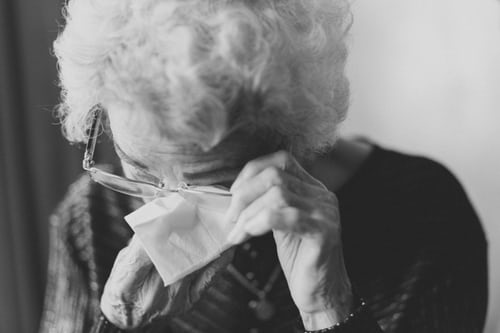Someone recommended the book to me after our daughter, Victoria, died, an award winning kid’s book by psychologist Dr. Leo Buscaglia called The Fall of Freddie the Leaf: A Story of Life for All Ages.
It’s about a leaf named Freddie who is in the process of watching all of the other leaves lose their brilliant summer green, change to beautiful fall hues of scarlet, orange and yellow, and finally lose their grip on the tree limb. Wiser leaves around Freddie explain the process so he can be prepared and ready when his time comes to be released from the tree and join the earth below. The book is supposed to help young children cope with and understand death.
I read the book to our son, Parker, who had just turned three when his sister died in childbirth. And then we read it every fall after that, on the first day of autumn. It was a ritual that calmed my heart.
When my son Cory was born, he joined the reading time. Now it’s time to pull the book off the library shelf and read it again, by myself this time since the boys are out of the house and on their own making their own lives in this world. They’re no strangers to loss and heartache. I think reading about Freddie has helped prepare them for life’s fragility.
But this year, on the first day of autumn, (which is next week Monday), I’ll be enjoying the fall foliage of the Northwest. I’m attending a wedding up there, and I’m looking forward to being in the thick of the season change. It’s one of my and my husband’s most precious memories of living in the Midwest: waking up to the cold snap in the air, watching the leaves turn brilliant colors and scatter across the roads and landscape. We get a little of that around here, and if we want to drive up the mountain behind us, we are usually treated to a pretty good show. But it never quite feels like enough. I can understand when people say they want to live some place where there are real seasons.
Kind of like life—living it as though it has seasons and leaning in to each of them.
Making the most of the fall season—
Aside from the colder weather tingling your skin, and the general slowdown in activities, fall can really be a state of mind. One you can use to your advantage.
Let go of stuff—
As you start to slow down, say goodbye to summer, and anticipate the darker, colder days of winter, why not rummage through your closet for items you’ve mentally discarded or promised yourself you didn’t wear this past fall and winter and probably won’t wear again in the next.
I was riffling through my closet yesterday, trying to find something to wear to church service that still had the vibrant colors of spring and summer to match my happy mood and our still-warm weather and my eyes settled on some items I’d forgotten I had (and knew I was looking forward to wearing again), and items I didn’t wear last year and knew I probably wouldn’t wear again this winter.
And I realized I didn’t want to wear them just because I felt guilty that they’d been hanging neglected in my closet.
I made a mental note that I’m going to screw up my courage, pluck them from their hanger, and take them to either a second-hand clothing store or donate them.
I’m saying the same for books now too. I’m running out of room to shelve them. And I’ve acquired a new load from my parents’ library in the last several years. Some of them remain in boxes, and I had to honestly ask myself: Will I ever read them? And will my kids even be interested in them?
Probably not. There are those I do hope they’ll find time to read in some distant future, but the chances of your children even being vaguely interested in those things that enticed you—like heirlooms and collections—will not likely appeal to your children. My younger son has already laid claim to my china and family heirlooms, (I have to talk to his brother first before that gets written in ink in my will), so I know what he’s interested in. But as a wise woman once counseled a group I attended:
Unless you have the space to store, the time to keep it clean, or the money to keep it, then it should go. No storage allowed for maybe items.
Relinquish those items from your heart and make room for something, or someone else!
Possessions don’t have to be kept just because they’re useful, though. Items that bring you peace and wonderful memories, or items that bring beauty to your life are important.
Let go of caring what others’ opinions, if they’re not yours—
While enjoying breakfast with one of my dearest friends and sister-in-Christ the other morning, she was verbally chastising herself for caring too much about what others think about her. It’s a lament I’ve heard frequently from her lately. She said she’s getting too old (70) for putting that much energy—and probably losing that much precious time—fretting over others, their opinions, and worrying about how she measures up around others.
I get it. I think the popular term now is being “authentic.” Being your true self in front of others.
I know what she means—not allowing too much mental real estate to be squatted upon and wasted with dressing to impress, acting a certain way to please, thinking a certain way to go along with the mob.
But I think this our society might be in danger of taking this too far. People today are too prone to blurt out whatever is on their mind, no matter how offensive, or even how true it might be. People don’t need (or even want) to hear everything you’re thinking, nor should they.
Feelings are important, and I think Christians are often too silent about how much they’re hurting because they think they need to look as though they always have it all together.
But feelings can be fleeting and deceiving. Didn’t the Apostle Paul say that he had become all things to all people for the sake of the gospel?
I think if we go forward with that thought, always ready to give a reason for our future hope, slow to anger and slow to speak, patient and long-suffering, full of God’s love for others, we will be able to chose wisely.
Let go of unrealistic goals—
What goals are you still striving for, or that keep nagging your brain, that you know are probably not the best, most practical, or timely for you? Maybe they need to be put on a back burner for the future; maybe they just aren’t good for you and never will be. Maybe they were really someone else’s goals.
Now might be a great time to re-evaluate them, especially when you’re dinging out your closet or bookshelves, or rooting around underneath your bed to clear dust bunnies and inspect all of those items you thought you wanted to keep that no longer hold your attention or heart.
Just give yourself permission to adjust and re-plan.
And give others in your life the same permission.
And now for the last one, which may be hard to hear or sound offensive.
Let go of toxic friends or acquaintances—
As part of our church’s “Choosing Wisely” series, our youth pastor gave a great sermon yesterday about those you have sitting at your table. Those people you spend a lot of time with, that influence you.
He wanted us to ask ourselves which people at our tables lift us up, sharpen us, help us grow in our relationship with God, make us better people.
On of the first things they tell an alcoholic to do when he admits he’s got a problem is to discard his old drinking buddies and hangouts and gather a new bunch of friends that will encourage him and be accountability partners.
It’s a good question, but hard to answer. You can’t always avoid toxic family members, but you can still treat them well and honorably even though you limit your contact with them.
You can have a lot of acquaintances, but you really can only have so many good friends. Why? Because nurturing friendships takes time and effort. Even Jesus spent time hand picking his closest friends while He was on earth.
Maybe this fall it’s a good time to pray about those people God wants in your life right now, those friends you want to gather at your table.
Sounds rough, doesn’t it?
But Scripture has a lot to say about friend choosing, especially in the Book of Proverbs.
It says that the righteous choose their friends carefully, so they won’t be led astray.
It tells us to walk with the wise so we can become wiser.
It tells us a friend is loyal.
It speaks of unreliable friends that bring us to ruin, and friends that stick closer than brothers.
It speaks of how sweet to the soul a friend’s encouragement can be and how beneficial their wise counsel.
It even says that open criticism is better than hidden love.
And I think we’ve all heard the passage from First Corinthians that says bad company corrupts good character.
Booker T. Washington even said that it was better to be alone than with people of bad quality.
So even if fall is a time to hunker down and prepare for the dark days of winter, it can be a time of soul refreshment and rejuvenation.
Freddie’s fall from his tree doesn’t have to be a time of sadness when it’s viewed in the context of the entire rhythm of life picture and future (and eternal) hope!
Until next week, prepare your heart and mind to enjoy your Autumnal Equinox next Monday and perhaps view it with a fresh, life changing perspective.
Next Week I’ll have more encouragement for you.
Blessings,
Andrea
*Some of this post was based on Guideposts’ online newsletter article by Holly Lebowitz Rossi. It’s posted in their Positive Living section.
 Andrea Arthur Owan is an award-winning inspirational writer, fitness pro and chaplain. She writes and works to help people live their best lives—physically, emotionally, and spiritually.
Andrea Arthur Owan is an award-winning inspirational writer, fitness pro and chaplain. She writes and works to help people live their best lives—physically, emotionally, and spiritually.
Andrea Arthur Owan is an award-winning inspirational writer, fitness pro and chaplain. She writes and works to help people live their best lives—physically, emotionally, and spiritually.





